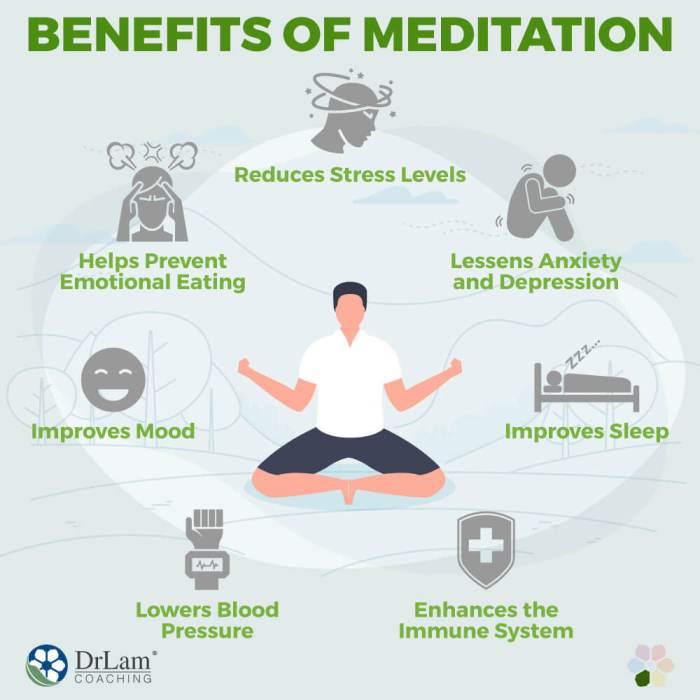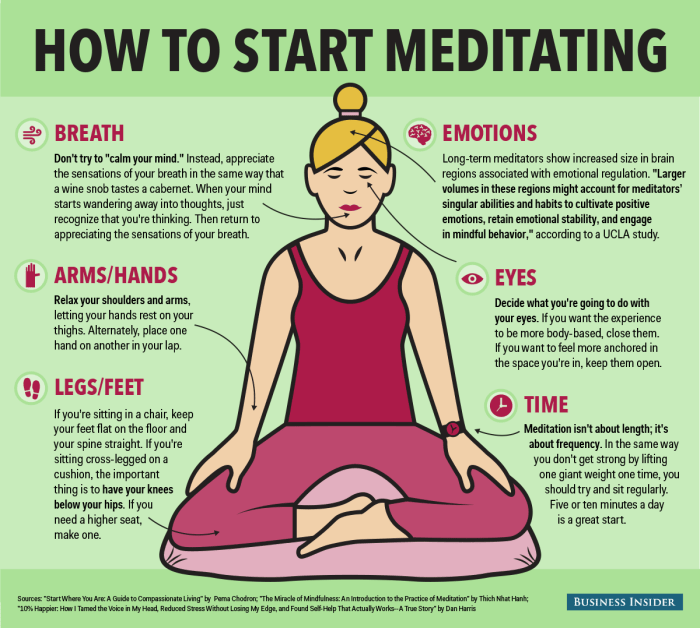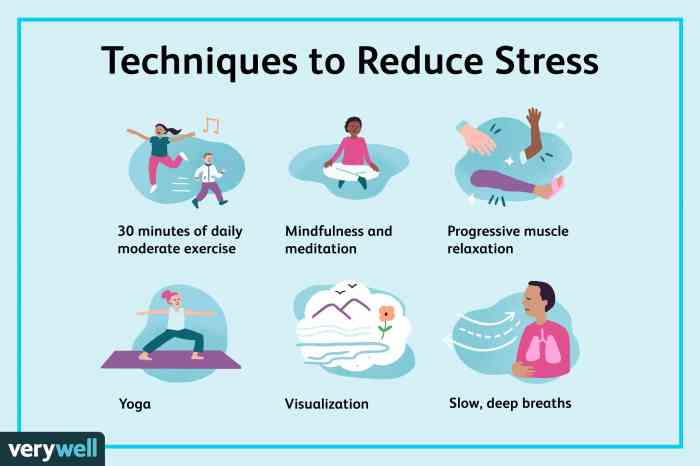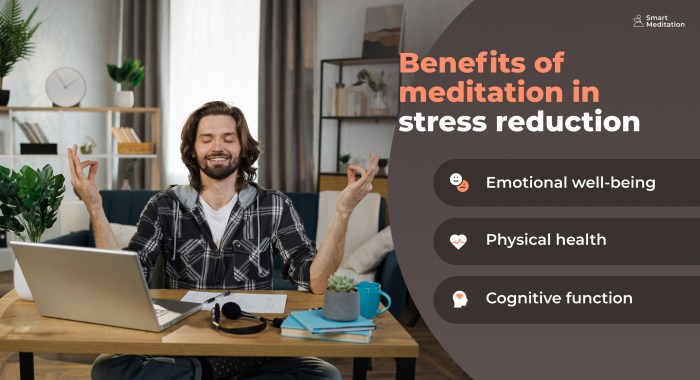How to Meditate for Reducing Chronic Stress and Fatigue sets the stage for this enthralling narrative, offering readers a glimpse into a story that is rich in detail with warm Minang communication style and brimming with originality from the outset.
Embark on a journey to discover the transformative power of meditation in alleviating stress and fatigue, as we delve into the intricacies of mindfulness and relaxation techniques designed to enhance your well-being.
Introduction to Meditation for Stress and Fatigue Reduction: How To Meditate For Reducing Chronic Stress And Fatigue
Meditation is a practice that involves focusing the mind on a particular object, thought, or activity to achieve mental clarity and emotional calmness. It has been used for centuries as a tool to reduce stress, anxiety, and fatigue, promoting overall well-being.
By incorporating meditation into your daily routine, you can experience a wide range of benefits that positively impact both your mental and physical health. Not only does meditation help in calming the mind and reducing stress levels, but it also enhances concentration, promotes self-awareness, and improves emotional stability.
Benefits of Meditation for Stress and Fatigue Reduction
- Mental Clarity: Meditation helps in clearing the mind of cluttered thoughts, allowing for better focus and mental clarity.
- Stress Reduction: By practicing meditation regularly, individuals can lower their stress levels and improve their ability to cope with daily challenges.
- Improved Sleep: Meditation can aid in promoting better sleep patterns, leading to reduced fatigue and increased energy levels.
- Enhanced Emotional Well-being: Regular meditation practice is known to boost emotional resilience and foster a positive outlook on life, reducing feelings of anxiety and depression.
Understanding Chronic Stress and Fatigue

Chronic stress is a prolonged state of mental or emotional strain that can have detrimental effects on the body and mind. When an individual experiences chronic stress, the body’s stress response system is constantly activated, leading to increased levels of stress hormones such as cortisol. This prolonged activation can result in various physical and psychological symptoms.The relationship between chronic stress, fatigue, and overall health is complex.
Chronic stress can contribute to feelings of fatigue and exhaustion, as the body is constantly in a heightened state of alertness. This can disrupt normal sleep patterns, leading to poor quality sleep and increased feelings of tiredness during the day. Additionally, chronic stress can weaken the immune system, making individuals more susceptible to illnesses and other health issues.Examples of symptoms associated with chronic stress and fatigue include:
- Persistent headaches
- Muscle tension or pain
- Digestive issues such as stomach pain or bloating
- Difficulty concentrating or making decisions
- Feelings of irritability or mood swings
- Insomnia or other sleep disturbances
It is essential to address chronic stress and fatigue promptly to prevent further negative impacts on both physical and mental well-being.
Techniques for Meditating to Reduce Stress and Fatigue

When it comes to reducing chronic stress and fatigue through meditation, there are several techniques that can be beneficial. Mindfulness meditation, body scan meditation, and loving-kindness meditation are popular methods known for their effectiveness in promoting relaxation and stress relief.
Seeking mental clarity? Discover 6 powerful meditation techniques in How to Meditate for Mental Clarity: 6 Powerful Techniques that can help sharpen your focus and improve your cognitive abilities.
Mindfulness Meditation
Mindfulness meditation involves focusing on the present moment without judgment. It helps individuals become more aware of their thoughts and feelings, allowing them to better manage stress and anxiety. Practicing mindfulness meditation regularly can lead to improved emotional well-being and increased resilience to stress.
If you struggle with anxiety, meditation can be a powerful tool to help reduce your symptoms. Learn about the 7 key techniques in How to Meditate to Reduce Anxiety: 7 Key Techniques to find relief.
Body Scan Meditation
Body scan meditation is a technique that involves systematically scanning the body for any areas of tension or discomfort. By bringing attention to different parts of the body, individuals can release physical tension and promote relaxation. This practice is especially helpful for reducing physical symptoms of stress and fatigue.
Are you looking to improve your mind-body connection through meditation? Check out this comprehensive guide on How to Meditate for Strengthening Your Mind-Body Connection for tips and techniques.
Loving-Kindness Meditation
Loving-kindness meditation focuses on cultivating feelings of compassion and kindness towards oneself and others. By practicing loving-kindness meditation, individuals can increase feelings of empathy, reduce negative emotions, and improve overall well-being. This technique is particularly beneficial for promoting emotional resilience and reducing stress.
Tips for Starting a Meditation Practice for Beginners

For beginners looking to start a meditation practice for stress and fatigue reduction, it’s important to start slowly and gradually build up your practice. Here are some tips to help you get started:
- Choose a quiet and comfortable space for meditation.
- Start with short meditation sessions, such as 5-10 minutes, and gradually increase the duration as you become more comfortable.
- Focus on your breath or a specific mantra to help anchor your attention during meditation.
- Be patient with yourself and allow your mind to wander without judgment. Simply bring your focus back to the present moment.
- Consider using guided meditation apps or recordings to help you stay focused during your practice.
Creating a Meditation Routine

Establishing a consistent meditation routine is crucial for reaping the full benefits of this practice. It requires dedication and commitment to make meditation a regular part of your daily life.
Ideal Time and Place for Meditation Practice
Finding the ideal time and place for meditation can greatly enhance your experience and make it easier to stick to your routine.
- Choose a time of day when you are least likely to be interrupted. This could be early in the morning before the day gets busy, or in the evening before bed.
- Find a quiet and peaceful space where you can sit comfortably without distractions. This could be a corner of your room, a garden, or any place where you feel at ease.
- Ensure the lighting is soft and the temperature is comfortable to create a soothing atmosphere for your practice.
Overcoming Common Obstacles When Starting a Meditation Practice, How to Meditate for Reducing Chronic Stress and Fatigue
When starting a meditation practice, you may encounter certain obstacles that can make it challenging to maintain consistency. Here are some tips to overcome them:
- Restlessness: If you find it hard to sit still during meditation, try incorporating gentle movement exercises like yoga or walking meditation to ease into a seated practice.
- Racing Thoughts: Acknowledge the thoughts that arise during meditation without judgment and gently bring your focus back to your breath or mantra to quiet the mind.
- Lack of Time: Start with just a few minutes of meditation each day and gradually increase the duration as you build your practice. Remember, even a short meditation session can be beneficial.
- Inconsistency: Set a reminder on your phone or calendar to meditate at the same time each day to establish a routine. Consistency is key to reaping the long-term benefits of meditation.
Mindfulness and Relaxation Exercises
Practicing mindfulness in meditation is crucial for reducing stress and fatigue. It involves focusing on the present moment without judgment, allowing you to acknowledge and accept your thoughts and feelings without becoming overwhelmed by them.
Simple Relaxation Exercises
Here are some relaxation exercises that you can incorporate into your daily meditation practice:
- Body Scan: Start by focusing on each part of your body, from head to toe, paying attention to any tension or discomfort. Breathe deeply and release any tension as you move through each body part.
- Progressive Muscle Relaxation: Tense each muscle group in your body for a few seconds and then release, starting from your toes and working your way up to your head. This helps to release physical tension and promote relaxation.
- Visualization: Close your eyes and imagine a peaceful place or scene that brings you comfort. Engage your senses by visualizing the sights, sounds, and smells of this place to help calm your mind.
Connection Between Deep Breathing Techniques and Stress Reduction
- Deep breathing techniques, such as diaphragmatic breathing, can help activate the body’s relaxation response and reduce stress. By taking slow, deep breaths, you can calm your nervous system and lower your heart rate and blood pressure.
- Practicing deep breathing during meditation can enhance your ability to stay present and focused, reducing the impact of stress and fatigue on your mind and body.
Benefits of Meditation on Physical and Mental Health

Meditation is not only beneficial for reducing stress and fatigue but also has a profound impact on both physical and mental health. Regular practice of meditation can lead to various positive outcomes in terms of overall well-being.
Physical Health Benefits of Regular Meditation Practice
- Reduction in blood pressure: Studies have shown that meditation can help lower blood pressure, reducing the risk of heart disease and stroke.
- Enhanced immune system: Meditation can strengthen the immune system, making the body more resilient to infections and illnesses.
- Pain management: Meditation has been found to be effective in reducing chronic pain by increasing pain tolerance and reducing inflammation.
- Improved sleep: Regular meditation practice can improve sleep quality and help alleviate insomnia and other sleep disorders.
How Meditation Improves Mental Clarity, Focus, and Emotional Well-being
- Increased focus and concentration: Meditation helps train the mind to stay present and focused, improving cognitive function and productivity.
- Stress reduction: By calming the mind and body, meditation can reduce stress levels and promote relaxation, leading to better emotional well-being.
- Enhanced emotional regulation: Meditation can help individuals manage their emotions more effectively, leading to greater emotional stability and resilience.
- Improved mental clarity: Regular meditation practice can clear the mind of clutter and distractions, leading to improved mental clarity and decision-making.
Scientific Evidence Supporting the Positive Impact of Meditation on Overall Health
- A study published in the Journal of the American Medical Association (JAMA) found that mindfulness meditation can reduce symptoms of anxiety and depression.
- Research from Harvard Medical School has shown that meditation can change the brain’s structure, improving memory, learning, and emotional regulation.
- Another study published in the journal Psychoneuroendocrinology found that meditation can reduce levels of cortisol, the stress hormone, in the body.
- Multiple studies have demonstrated that regular meditation practice can lead to improvements in overall well-being, including better mental health and physical health outcomes.
As we conclude our exploration of meditation for stress reduction, remember that the path to inner peace is within reach through consistent practice and dedication. Embrace the tranquility that meditation offers and witness the profound changes it can bring to your life.